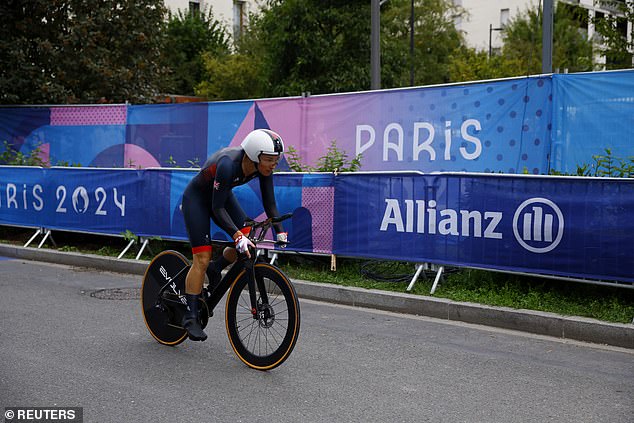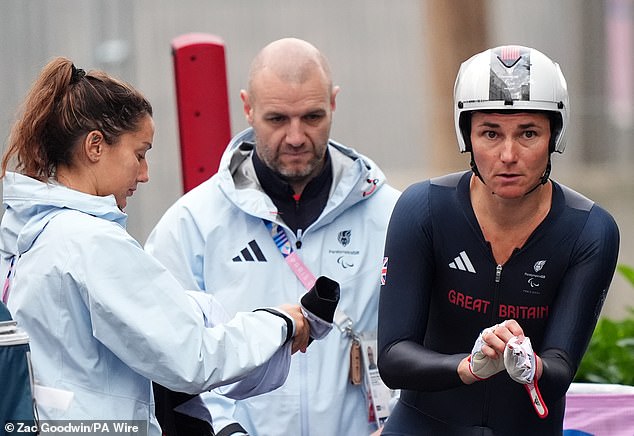Dame Sarah Storey wins record-extending 18th Paralympic gold medal with cycling time trial success – before accusing organisers of sexism over ‘appalling’ Paris course
- Storey won gold in the women’s C5 time trial at the Paris 2024 Paralympic Games
- The 46-year-old is competing in the ninth Paralympic Games of her career
- Storey, who made his debut in Barcelona in 1992, is Britain’s most successful Paralympic athlete
Sarah Storey wins because she goes the extra mile. She travelled to Paris with her children in May to check out the time trial course, where she won her fifth consecutive Paralympic gold medal on Wednesday.
She was amazed to discover that the route was only 14.1km long – almost 8km shorter than any Paralympic course she has ever competed on.
She wrote a letter to the Paralympic organizers to protest, noting that competitors needed something longer and harder to test themselves on and project the quality of their sport. No response.
While most of the men in her category raced two laps of the course in Clichy-sur-Bois, a suburb in northwestern Paris, almost all of the women were limited to one lap. Blink and you’d have missed her.
Storey warmed up in the dark, raced not long after 8am and won gold by 8.30am. She said the difference with the men’s race represented sexism and that the women’s course had been “terrible”.
Dame Sarah Storey secured her 18th Paralympic gold medal with success in the time trial in Paris

Storey stormed to gold at her ninth Paralympic Games before crashing out on the track length

“This is the shortest Paralympic time trial we’ve ever had,” Storey said.
“It’s a real shame because you don’t get the chance to show parasport the way you want to. There’s enough time in the day for us to do two laps, just like the men. At championships you expect to race at least 22 km. I really hope they never do that again for the women.”
Seven of the twelve men’s races and one of the seven women’s time trials on Wednesday were over longer distances.
Paralympic organizers appeared to have failed by trying to cram 19 time trial events into one day: four-and-a-half hours of racing, including a whopping three-hour break midway through the race. But no one from the local organizing committee or the UCI governing body responded to requests for comment or explanation.
Limiting the visibility of women’s competitions is a sign of gross complacency on the part of organisers, especially given the clear sense that these Paralympic Games are struggling to achieve the same breakthrough they have seen since London 2012.
Storey’s time trial was actually more competitive than those she has won at four previous Paralympics. The 46-year-old, who does not have a functioning left hand, was seven seconds behind teenage French rider Heidi Gaugain at the 5.8km course checkpoint, eventually winning by 4.69 seconds – 32 years after her Paralympic debut in Barcelona in 1992. Gaugain, 27 years Storey’s junior, won silver.

Storey claimed the short track was ‘a real disgrace’ and did not contribute to the presentation of para sport
Storey’s compatriot Blaine Hunt, who finished 11th in the men’s 28.2km event, supported her criticism. “If there was parity, that would be great,” Hunt said.
“On the track, the women do 500 meters, we do a kilometer. I see no reason why they can’t do a kilometer. I’m all for things coming together and being equal and I’ll fight for that until the end.”
But Britain’s Fran Brown didn’t share the same sentiment as the 18-time Paralympic gold medallist. “We can go a bit further but we’ve all done the same course today so make the most of it,” Brown said after winning silver in her C1-3 category.
Storey, who does not have a functioning left hand, said it was her duty to speak out. “I’m happy, but there are always ways to make things better for the people who come after you,” she said.

